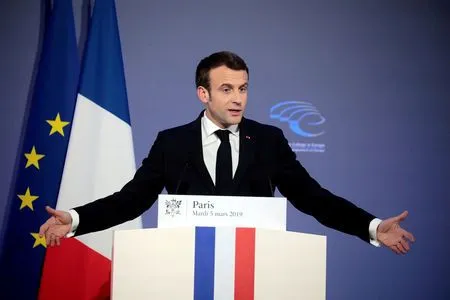Các chính trị gia tại Pháp hiện đang tìm kiếm giải pháp để đáp trả lại làn sóng biểu tình đang tiếp diễn liên quan đến gia tăng chi phí sinh hoạt.
Phong trào “Áo vàng” đã kéo dài đến tuần thứ 17 liên tiếp dù cho số người tham gia đã giảm xuống mức thấp nhất so với thời gian đầu phong trào mới nổ ra vào tháng 11/2018.
Quyết định cấp thêm 10 tỷ euro hỗ trợ cho người thu nhập thấp và thay đổi thuế nhiên liệu vẫn chưa đủ thuyết phục người biểu tình để chấm dứt hoạt động.

Tổng thống Emmanuel Macron đang tìm giải pháp chấm dứt phong trào "Áo vàng". Ảnh: Reuters
Tổng thống Macron đang nỗ lực tìm kiếm cách chặn đứng làn sóng phản đối thông qua tranh luận chính sách quốc gia với hàng loạt các buổi tham vấn với đại diện các địa phương có thời hạn đến cuối tuần sau, trước khi Tổng thống ra kết luận vào tháng Tư.
Các nhà lập pháp thuộc đảng La République en Marche (LREM) mà Tổng thống Macron là người sáng lập cũng đưa ra kiến nghị. Một nội dung trong đó đề xuất chỉnh sửa các tính lương hưu cho những người nghèo nhất, theo lời chủ tịch đảng LREM nói với tờ Le Parisien hôm 10/3.
Chính phủ Pháp năm 2019 đã giới hạn mức tăng lương hưu là 0,3% sau khi chỉ số giá tiêu dùng nước này tăng vọt lên 1,8% năm 2018 và dự báo sẽ duy trì trên mức 1% trong cả năm 2019.
Ông Guerini không nêu cụ thể chi phí phát sinh kéo theo khi liên kết một số khoản lương hưu với lạm phát.
Ngoài ra, trong giải pháp của LREM cũng có đề xuất cho thuê các dòng xe ít tiêu hao nhiên liệu với giá dưới 50 euro cho các hộ thu nhập thấp.
Đề xuất tăng thuế nhiên liệu để chống biến đổi khí hậu hiện đã được bãi bỏ của Tổng thống Emmanuel Macron gây phẫn nộ cho người dân vùng ngoại thành vì họ đa phần phải sử dụng ô tô để đi làm.
Macron’s party favors pensions boost for poorest amid protests
(Reuters) - France should link pension rises for the poorest retirees with inflation again, the head of President Emmanuel Macron's ruling party said on Sunday, as politicians seek a response to a wave of protests over high living costs.
"Yellow vest" demonstrators kept up the pressure for the 17th weekend in a row, even as turnout across France fell to its lowest since the movement erupted last November as a backlash against fuel tax hikes.
An extra 10 billion euros ($11 billion) in support for low income workers and a U-turn on the fuel tax have yet to convince many to end their protests.
Macron is seeking to stem discontent via a national policy debate, with a marathon of town hall-style consultations with local representatives due to wrap up next week before the president returns his conclusions in April.
Lawmakers from his own La Republique en Marche party (LREM, or Republic on the Move) - an upstart force behind Macron's electoral victory in 2017 that has a majority in the lower house of parliament - are also presenting policy proposals.
One of these would tweak the way pensions are calculated for the poorest, LREM party chief Stanislas Guerini told Le Parisien newspaper on Sunday.
For 2019, the government had limited pensions rises to 0.3 percent - a modest hike after French consumer prices rose 1.8 percent on average in 2018 and are expected to remain above 1 percent this year.
Guerini did not flesh out the cost entailed in potentially linking some pensions to inflation.
Among other measures, LREM will also propose making rentals of cleaner car models available to low income households for under 50 euros ($56) a month, Guerini said.
The now-scrapped fuel tax hike, heralded by Macron as part of a bid to fight climate change, had especially incensed people in rural areas who depend on their cars to get to work.
Guerini said LREM would also suggest mechanisms to allow people to put forward law proposals.
"As soon as a topic mobilizes a certain number of people, let's say a million, a draft law could be pulled together by an assembly of citizens chosen through lots," Guerini said in the interview.
